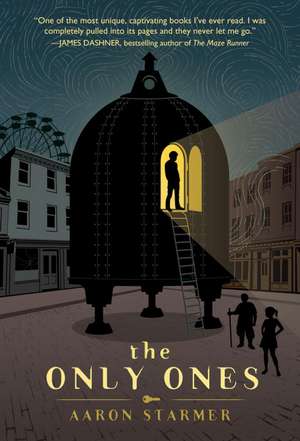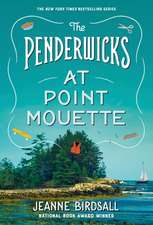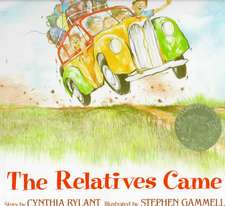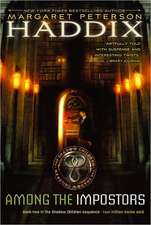The Only Ones
Autor Aaron Starmeren Limba Engleză Paperback – 10 sep 2012 – vârsta de la 10 ani
These words welcome Martin Maple to the village of Xibalba. Like the other children who've journeyed there, he faces an awful truth.
He was forgotten.
When families and friends all disappeared one afternoon, these were the only ones left behind.
There's Darla, who drives a monster truck, Felix, who uses string and wood to rebuild the Internet, Lane, who crafts elaborate contraptions, and nearly 40 others, each equally brilliant and peculiar.
Inspired by the prophesies of a mysterious boy who talks to animals, Martin believes he can reunite them with their loved ones. But believing and knowing are two different things, as he soon discovers with the push of a button, flip of a switch, turn of a dial. . . .
Preț: 55.81 lei
Nou
Puncte Express: 84
Preț estimativ în valută:
10.68€ • 11.18$ • 8.89£
10.68€ • 11.18$ • 8.89£
Carte disponibilă
Livrare economică 10-24 martie
Preluare comenzi: 021 569.72.76
Specificații
ISBN-13: 9780385740449
ISBN-10: 0385740441
Pagini: 321
Dimensiuni: 130 x 191 x 23 mm
Greutate: 0.23 kg
Editura: Yearling Books
ISBN-10: 0385740441
Pagini: 321
Dimensiuni: 130 x 191 x 23 mm
Greutate: 0.23 kg
Editura: Yearling Books
Notă biografică
AARON STARMER 's first novel was the comic children's adventure Dweeb. He lives with his wife in Hoboken, New Jersey.
Extras
1
The Mainland
The stars melted away. Martin had rowed through the night. The next time I see stars, he thought, it won’t be from the island and it won’t be from the ocean.
For through the first spits of morning sunlight, he spied the mainland only a few hundred yards ahead of him. The island had ten houses, while the mainland had hundreds. Dozens of docks lined the water’s edge, and countless boats bobbed quietly in a harbor. Many of the boats were half submerged. A few were almost entirely covered in water. Broken masts stuck up through the froth like stubborn little birch trees.
Seagulls circled above him as Martin guided the boat up to a dock. He climbed out and scanned the surroundings. Streets and paths wound their way through the town and into hills in the distance. Cars were strewn everywhere--along the streets, in the streets, even in the grass, which was as high as Martin’s shoulder. Martin had never seen a car before, but he knew that they were “boats with wheels and windshield wipers,” as his father put it, and in nearly every book Martin had read, they were the preferred manner of transportation.
Many of the buildings near the dock were decorated with signs announcing things like the coldest beer in town or fine dining for fine folks. Martin hadn’t eaten in a day, and while he was accustomed to going without a meal or two, the row from the island had left him ravenous.
He made his way down the dock and entered the first building he came upon, a modest construction with a hand-carved sign above the door that read the barnacled butcher.
The first things he noticed were the red stains on the floor. Then a scattering of meat- and marrow-picked bones. Lingering scents of rot and feces hit him next. It had seemed a reasonable place to find a meal, but he had read far too many books about murderers and monsters. He wasn’t going to risk meeting such things.
For now, he would explore the rest of the town. Perhaps he would meet someone. Perhaps someone would know where to find George. It had been almost two years since he had seen a soul, and he desperately needed to see one now.
But there wasn’t anyone anywhere he looked.
Without even a sliver of warning, a fog hustled in. Martin became blind to everything more than a few yards away. So he kept to the winding streets, hiking for more than a mile and dodging car after car--some with their windows open and their seat cushions torn into tidy little nests; all abandoned and splattered white with gull guano.
If there’s not someone, he thought, then there must be something that can tell me where I am and where I should go.
For now, the best the world could give Martin was a pile of waterlogged books, pouring out onto the street. He stepped over them and onto a wild, dewy lawn, where he found a series of plastic tables overturned on the ground, their legs sticking up and hugged by weeds. Next to one table, he found a sign. He lifted it, wiped away the mud, and read: Gently Used Books--Support Our Renovations This Saturday and Sunday.
He placed the sign down and squinted through the fog at a building across the lawn. He could barely make out a line of steel letters on the brick entryway.
LIBRARY
It was chillier inside. And dark--so dark that Martin had to let his eyes adjust for a minute before taking a step beyond the doorway. There was an odor, a mustiness, but nothing like in the butcher shop. The floors were relatively free of debris, and as he made his way past a large wooden desk, Martin drew in a breath of relief.
Thousands of books filled dozens of shelves. A few books lay open on the floor, but for the most part, everything seemed in good shape. Martin placed his hand on a line of bindings, then ran his fingers down the row, releasing flurries of dust and listening to the beautiful thwap, thwap, thwap.
He lifted a book off a shelf and stared at its glossy cover, adorned with a photograph of the moon. It would take a lifetime to read every book in the library, and Martin began to wonder if maybe it wasn’t such a bad way to spend his days. Maybe he wasn’t ready to go on. Maybe he was meant to see the world through the filter of books.
Something in the world had changed, though. It couldn’t always have been like this, and the books couldn’t answer the most important questions.
What happened?
Where is everyone?
Why is something pressing against my knee?
Martin looked down to see a dark mass at his feet. A black nose rubbed gently against his right knee, then moved down his shin until it came to his sock, where it tried to work itself inside with an inquisitive snuff.
Instinctively, Martin reached his hand down to pet the animal at his feet. Its fur was thick and course, like slightly damp hay. He had petted dogs on the island but had never felt one like this. As he pulled his hand away, the nose followed his fingers. Martin got a closer look. It had a snout like a dog’s, but its head was rounder and its ears were stiffer. It raised a paw and placed it in the bend of Martin’s elbow. Its claws were as thick as Martin’s fingers. The pads of its feet were as big as his hands.
“Hello,” Martin said softly.
The creature let out a low rumbling sound--soothing at first, then more anxious.
“I’m Martin Maple. From the island. I’m here for a visit. To have a look around.”
The creature answered by pulling its head away from Martin. It opened its mouth in what looked like a yawn. Small daggers for teeth, hot breath. It lifted itself until it was standing on two feet. Even standing straight up, it was shorter than Martin by a good foot and a half, but Martin’s body still tensed in recognition.
“You’re a bear.”
The bear blinked.
“I’ve read about you. You’re smaller than I expected. You don’t seem so mean.”
Martin eased his hand back toward the bear, planning to calm it by petting its head. But just as his hand reached the snout, he felt a warm, damp breeze blow onto the top of his neck.
Then he heard a rumble.
It was similar to the rumble the bear had made, but it was coming from behind Martin. It was also deeper and louder. Vibrations crept across Martin’s scalp.
He turned around in time to see another bear moving slowly toward him. It was three times as big as the first and had a fox dangling from its jaws. The fox was jerking violently, but the bear didn’t seem to notice. Its eyes were locked on Martin.
All at once came a flash of teeth and nostrils as the bigger bear tossed the fox into the darkness and lunged at Martin. Martin threw himself against the bookshelf. A cascade of hardcovers raged out, and the entire thing crashed to the ground.
Martin looked up from the pile of wood and paper. The smaller bear was smiling down at him, and the larger one was rising to its feet, recovering from its failed lunge. Martin’s legs flew into a fit of kicking. Books launched into the faces of both bears. They turned their heads, but their backs still blocked the entrance to the library. Martin scrambled to his feet and began to run. Weaving in and out of the aisles, he searched for any sign of sunlight. He would kick and claw a hole in the wall if need be. He had to get out of there.
Then he saw an orange dot in front of him. He zeroed in on it. He didn’t dare slow down or turn his head and look back. The dot was moving. It was going somewhere. He was going to follow it.
The orange dot darted purposefully across the floor, at a speed Martin could match but couldn’t beat. He followed it through aisles of books, down a hallway, through a wide-open room, all the way to a staircase. Then, without any warning, it stopped. Martin closed in.
At the foot of the staircase sat the fox that had been dangling from the bear’s mouth. Its orange fur was shifting to red as blood plotted a slow and insidious takeover. One of the fox’s legs was bent, and stuck out uselessly to the side. Exhausted, the animal looked up at Martin. It looked at the stairs it had to climb. It curled into a ball.
Without thinking, Martin snatched the fox, tucked it under his arm, and raced up the stairs. At the top, he saw a pane of glass as big as a door. It was damp with the fog but also glowing with the small bit of sunlight that had found its way through. He lowered his shoulder, held the fox behind his back, and plowed into the glass.
Instead of breaking, the glass heaved. Then it popped from the wall like a head off a dandelion and fluttered down into the grass. Martin’s body swayed in the hole for a moment, and his canvas bag dangled and tried to pull his shoulder down with its weight. Behind him was the sound of the bears thundering up the stairway. Below him was the mist-soaked backyard of the library. He looked out to a tight line of trees where a forest began. Gravity and momentum finally took over and Martin closed his eyes as he and the fox tumbled down into a patch of hardy bushes below.
From the Hardcover edition.
The Mainland
The stars melted away. Martin had rowed through the night. The next time I see stars, he thought, it won’t be from the island and it won’t be from the ocean.
For through the first spits of morning sunlight, he spied the mainland only a few hundred yards ahead of him. The island had ten houses, while the mainland had hundreds. Dozens of docks lined the water’s edge, and countless boats bobbed quietly in a harbor. Many of the boats were half submerged. A few were almost entirely covered in water. Broken masts stuck up through the froth like stubborn little birch trees.
Seagulls circled above him as Martin guided the boat up to a dock. He climbed out and scanned the surroundings. Streets and paths wound their way through the town and into hills in the distance. Cars were strewn everywhere--along the streets, in the streets, even in the grass, which was as high as Martin’s shoulder. Martin had never seen a car before, but he knew that they were “boats with wheels and windshield wipers,” as his father put it, and in nearly every book Martin had read, they were the preferred manner of transportation.
Many of the buildings near the dock were decorated with signs announcing things like the coldest beer in town or fine dining for fine folks. Martin hadn’t eaten in a day, and while he was accustomed to going without a meal or two, the row from the island had left him ravenous.
He made his way down the dock and entered the first building he came upon, a modest construction with a hand-carved sign above the door that read the barnacled butcher.
The first things he noticed were the red stains on the floor. Then a scattering of meat- and marrow-picked bones. Lingering scents of rot and feces hit him next. It had seemed a reasonable place to find a meal, but he had read far too many books about murderers and monsters. He wasn’t going to risk meeting such things.
For now, he would explore the rest of the town. Perhaps he would meet someone. Perhaps someone would know where to find George. It had been almost two years since he had seen a soul, and he desperately needed to see one now.
But there wasn’t anyone anywhere he looked.
Without even a sliver of warning, a fog hustled in. Martin became blind to everything more than a few yards away. So he kept to the winding streets, hiking for more than a mile and dodging car after car--some with their windows open and their seat cushions torn into tidy little nests; all abandoned and splattered white with gull guano.
If there’s not someone, he thought, then there must be something that can tell me where I am and where I should go.
For now, the best the world could give Martin was a pile of waterlogged books, pouring out onto the street. He stepped over them and onto a wild, dewy lawn, where he found a series of plastic tables overturned on the ground, their legs sticking up and hugged by weeds. Next to one table, he found a sign. He lifted it, wiped away the mud, and read: Gently Used Books--Support Our Renovations This Saturday and Sunday.
He placed the sign down and squinted through the fog at a building across the lawn. He could barely make out a line of steel letters on the brick entryway.
LIBRARY
It was chillier inside. And dark--so dark that Martin had to let his eyes adjust for a minute before taking a step beyond the doorway. There was an odor, a mustiness, but nothing like in the butcher shop. The floors were relatively free of debris, and as he made his way past a large wooden desk, Martin drew in a breath of relief.
Thousands of books filled dozens of shelves. A few books lay open on the floor, but for the most part, everything seemed in good shape. Martin placed his hand on a line of bindings, then ran his fingers down the row, releasing flurries of dust and listening to the beautiful thwap, thwap, thwap.
He lifted a book off a shelf and stared at its glossy cover, adorned with a photograph of the moon. It would take a lifetime to read every book in the library, and Martin began to wonder if maybe it wasn’t such a bad way to spend his days. Maybe he wasn’t ready to go on. Maybe he was meant to see the world through the filter of books.
Something in the world had changed, though. It couldn’t always have been like this, and the books couldn’t answer the most important questions.
What happened?
Where is everyone?
Why is something pressing against my knee?
Martin looked down to see a dark mass at his feet. A black nose rubbed gently against his right knee, then moved down his shin until it came to his sock, where it tried to work itself inside with an inquisitive snuff.
Instinctively, Martin reached his hand down to pet the animal at his feet. Its fur was thick and course, like slightly damp hay. He had petted dogs on the island but had never felt one like this. As he pulled his hand away, the nose followed his fingers. Martin got a closer look. It had a snout like a dog’s, but its head was rounder and its ears were stiffer. It raised a paw and placed it in the bend of Martin’s elbow. Its claws were as thick as Martin’s fingers. The pads of its feet were as big as his hands.
“Hello,” Martin said softly.
The creature let out a low rumbling sound--soothing at first, then more anxious.
“I’m Martin Maple. From the island. I’m here for a visit. To have a look around.”
The creature answered by pulling its head away from Martin. It opened its mouth in what looked like a yawn. Small daggers for teeth, hot breath. It lifted itself until it was standing on two feet. Even standing straight up, it was shorter than Martin by a good foot and a half, but Martin’s body still tensed in recognition.
“You’re a bear.”
The bear blinked.
“I’ve read about you. You’re smaller than I expected. You don’t seem so mean.”
Martin eased his hand back toward the bear, planning to calm it by petting its head. But just as his hand reached the snout, he felt a warm, damp breeze blow onto the top of his neck.
Then he heard a rumble.
It was similar to the rumble the bear had made, but it was coming from behind Martin. It was also deeper and louder. Vibrations crept across Martin’s scalp.
He turned around in time to see another bear moving slowly toward him. It was three times as big as the first and had a fox dangling from its jaws. The fox was jerking violently, but the bear didn’t seem to notice. Its eyes were locked on Martin.
All at once came a flash of teeth and nostrils as the bigger bear tossed the fox into the darkness and lunged at Martin. Martin threw himself against the bookshelf. A cascade of hardcovers raged out, and the entire thing crashed to the ground.
Martin looked up from the pile of wood and paper. The smaller bear was smiling down at him, and the larger one was rising to its feet, recovering from its failed lunge. Martin’s legs flew into a fit of kicking. Books launched into the faces of both bears. They turned their heads, but their backs still blocked the entrance to the library. Martin scrambled to his feet and began to run. Weaving in and out of the aisles, he searched for any sign of sunlight. He would kick and claw a hole in the wall if need be. He had to get out of there.
Then he saw an orange dot in front of him. He zeroed in on it. He didn’t dare slow down or turn his head and look back. The dot was moving. It was going somewhere. He was going to follow it.
The orange dot darted purposefully across the floor, at a speed Martin could match but couldn’t beat. He followed it through aisles of books, down a hallway, through a wide-open room, all the way to a staircase. Then, without any warning, it stopped. Martin closed in.
At the foot of the staircase sat the fox that had been dangling from the bear’s mouth. Its orange fur was shifting to red as blood plotted a slow and insidious takeover. One of the fox’s legs was bent, and stuck out uselessly to the side. Exhausted, the animal looked up at Martin. It looked at the stairs it had to climb. It curled into a ball.
Without thinking, Martin snatched the fox, tucked it under his arm, and raced up the stairs. At the top, he saw a pane of glass as big as a door. It was damp with the fog but also glowing with the small bit of sunlight that had found its way through. He lowered his shoulder, held the fox behind his back, and plowed into the glass.
Instead of breaking, the glass heaved. Then it popped from the wall like a head off a dandelion and fluttered down into the grass. Martin’s body swayed in the hole for a moment, and his canvas bag dangled and tried to pull his shoulder down with its weight. Behind him was the sound of the bears thundering up the stairway. Below him was the mist-soaked backyard of the library. He looked out to a tight line of trees where a forest began. Gravity and momentum finally took over and Martin closed his eyes as he and the fox tumbled down into a patch of hardy bushes below.
From the Hardcover edition.









